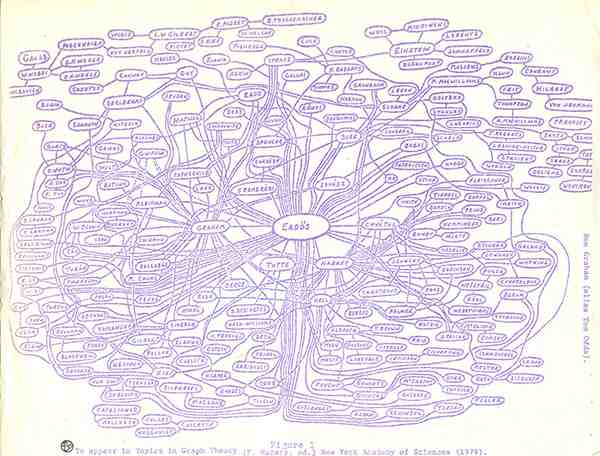8 things the world's most successful people all have in common
IQ is no replacement for hard work

A free daily email with the biggest news stories of the day – and the best features from TheWeek.com
You are now subscribed
Your newsletter sign-up was successful

I've posted a lot about the strategies of very successful people: artists, scientists, business leaders…
Looking back, what patterns do we see?
Busy, busy
The Week
Escape your echo chamber. Get the facts behind the news, plus analysis from multiple perspectives.

Sign up for The Week's Free Newsletters
From our morning news briefing to a weekly Good News Newsletter, get the best of The Week delivered directly to your inbox.
From our morning news briefing to a weekly Good News Newsletter, get the best of The Week delivered directly to your inbox.
Daily Rituals: How Artists Work, examines the work habits of over 150 of the greatest writers, artists, and scientists.
What did they all have in common? A relentless pace of work.
"Sooner or later," Pritchett writes, "the great men turn out to be all alike. They never stop working. They never lose a minute. It is very depressing." [Daily Rituals: How Artists Work]
What did Stanford professor Jeffrey Pfeffer find when he looked at high achievers like LBJ and Robert Moses?
A free daily email with the biggest news stories of the day – and the best features from TheWeek.com
Sixty to 65 hour work weeks were not uncommon.
In a study of general managers in industry, John Kotter reported that many of them worked 60 to 65 hours per week–which translates into at least six 10-hour days. The ability and willingness to work grueling hours has characterized many powerful figures… Energy and strength provide many advantages to those seeking to build power. [Managing With Power: Politics and Influence in Organizations]
When Mihaly Csikszentmihalyi studied geniuses for his book Creativity, he realized something fascinating about IQ. No one who changed the world had an IQ under 130 — but the difference between 130 and 170 was negligible. As long as you were past the 130 IQ threshold, it was all about how hard you worked. (More on the work habits of geniuses here.)
Just say no
Warren Buffett once said:
The difference between successful people and very successful people is that very successful people say "no" to almost everything.
And that's what gives them the time to accomplish so much.
In Creativity, Csikszentmihalyi makes note of the number of high achievers who declined his request to be in the book. Why did they say no? They were too busy with their own projects to help him with his.
Achievement requires focus. And focus means saying "no" to a lot of distractions.
Know what you are
In his classic essay "Managing Oneself," Pete Drucker is very clear: ignore your weaknesses and keep improving your strengths.
In identifying opportunities for improvement, don't waste time cultivating skill areas where you have little competence. Instead, concentrate on — and build on — your strengths. ["Managing Oneself"]
This means knowing who you are, what you are and what you are good at. Harvard professor Gautam Mukunda, author of Indispensable: When Leaders Really Matter, says this is key for leaders:
More than anything else, "Know thyself." Know what your type is. … Think about your own personality… For instance, if you are a classic entrepreneur, you can't work in an organization. Know that. [Indispensable: When Leaders Really Matter]
(More on knowing your strengths here.)
Build networks
Nobody at the top of the heap goes it alone. And those at the center of networks benefit the most.
Paul Erdos is the undeniable center of the mathematics world. Ever heard of "six degrees of Kevin Bacon"? Paul Erdos is the Kevin Bacon of math.
This is no exaggeration. In fact, it's barely a metaphor — it's just fact.

How did he become the center of the math world?
He was a giver.
I've posted a lot about networking and as great networkers like Adam Rifkin advise, Paul Erdos gave to others. He made those around him better.
He knew better than you yourself knew what you were capable of… He gave the confidence that many of us needed to embark on mathematical research. [The Man Who Loved Only Numbers: The Story of Paul Erdos and the Search for Mathematical Truth]
(More on networking here.)
Create good luck
Luck isn't magical — there's a science to it.
Richard Wiseman studied lucky people for his book Luck Factor, and broke down what they do right. Certain personality types are luckier because they behave in a way that maximizes the chance for good opportunities. By being more outgoing, open to new ideas, following hunches, and being optimistic, lucky people create possibilities.
Does applying these principles to your life actually work? Wiseman created a "luck school" to test the ideas — and it was a success.
In total, 80 percent of people who attended Luck School said that their luck had increased. On average, these people estimated that their luck had increased by more than 40 percent. [Luck Factor]
(More about creating luck here.)
Have grit
Intelligence and creativity are great but you can't quit when the going gets tough if you really want to accomplish anything big.
That's grit. Perseverance. And it's one of the best predictors of success there is.
The best predictor of success, the researchers found, was the prospective cadets' ratings on a noncognitive, nonphysical trait known as "grit" — defined as "perseverance and passion for long-term goals." [Drive: The Surprising Truth About What Motivates Us]
Researchers have found that grit exists apart from IQ and is more predictive of success than IQ in a variety of challenging environments:
Defined as perseverance and passion for long-term goals, grit accounted for an average of 4 percent of the variance in success outcomes, including educational attainment among 2 samples of adults (N = 1,545 and N = 690), grade point average among Ivy League undergraduates (N = 138), retention in 2 classes of United States Military Academy, West Point, cadets (N = 1,218 and N = 1,308), and ranking in the National Spelling Bee (N = 175).
Howard Gardner studied some of the greatest geniuses of all time. One quality they all had in common sounds an awful lot like grit.
… when they fail, they do not waste much time lamenting; blaming; or, at the extreme, quitting. Instead, regarding the failure as a learning experience, they try to build upon its lessons in their future endeavors. Framing is most succinctly captured in aphorism by French economist and visionary Jean Monnet: "I regard every defeat as an opportunity." [Creating Minds: An Anatomy of Creativity Seen Through the Lives of Freud, Einstein, Picasso, Stravinsky, Eliot, Graham, and Ghandi]
Here's Angela Duckworth giving a TED talk on grit:

(More on how to be "grittier" here.)
Make awesome mistakes
Failure is essential.
Losers like to hear that because it makes them feel better about their past mistakes. Winners use it to go make more mistakes they can learn from.
Always be experimenting. In his excellent book Little Bets, Peter Sims explains the system used by all the greats:
The mindset is what makes a big difference. The willingness to spend 5 to 10 percent of your time doing experiments will, over the long run, really open up that part of you that can be more creative and entrepreneurial, and yield, hopefully, some new opportunities that you hadn't thought of before trying something. [Little Bets]
You must wrestle with your ideas. Dissect, combine, add, subtract, turn them upside down, and shake them. Get ideas colliding.
Successful creators engage in an ongoing dialogue with their work. They put what's in their head on paper long before it's fully formed, and they watch and listen to what they've recorded, zigging and zagging until the right idea emerges. [Zig Zag: The Surprising Path to Greater Creativity]
How do you start? Do like the greats and keep a notebook.
(More on the creative process used by experts here.)
Find mentors
You cannot go it alone. It can be hard to learn from books. And the internet makes it difficult to separate truth from fiction.
You need someone who has been there to show you the ropes. A Yoda. A Mister Miyagi.
Yes, 10K hours of deliberate practice can make you an expert but what makes you dedicate 10K hours to something in the first place?
As Adam Grant of Wharton explains, the answer is great mentors:
Why would somebody invest deliberate practice in something? It turns out that actually most of these world-class performers had a first coach, or a first teacher, who made the activity fun.
(More on finding the best mentor for you here.)
Sum up
Eight things you can do to be like the best:
- Stay busy
- Just say no
- Know what you are
- Build networks
- Create good luck
- Have grit
- Make awesome mistakes
- Find mentors
What's the easiest way to get started? Go here.
Join 45K+ readers. Get a free weekly update via email here.
More from Barking Up The Wrong Tree...
-
 The ‘ravenous’ demand for Cornish minerals
The ‘ravenous’ demand for Cornish mineralsUnder the Radar Growing need for critical minerals to power tech has intensified ‘appetite’ for lithium, which could be a ‘huge boon’ for local economy
-
 Why are election experts taking Trump’s midterm threats seriously?
Why are election experts taking Trump’s midterm threats seriously?IN THE SPOTLIGHT As the president muses about polling place deployments and a centralized electoral system aimed at one-party control, lawmakers are taking this administration at its word
-
 ‘Restaurateurs have become millionaires’
‘Restaurateurs have become millionaires’Instant Opinion Opinion, comment and editorials of the day